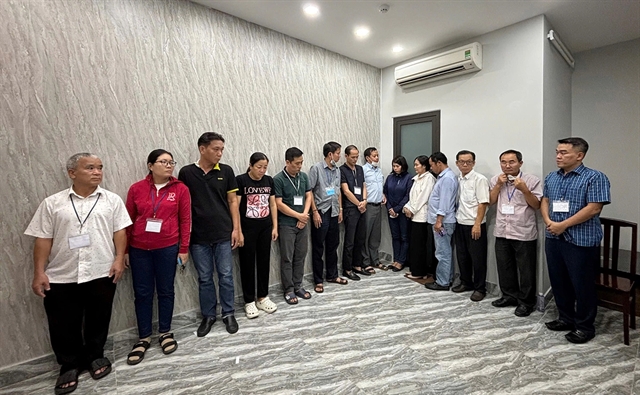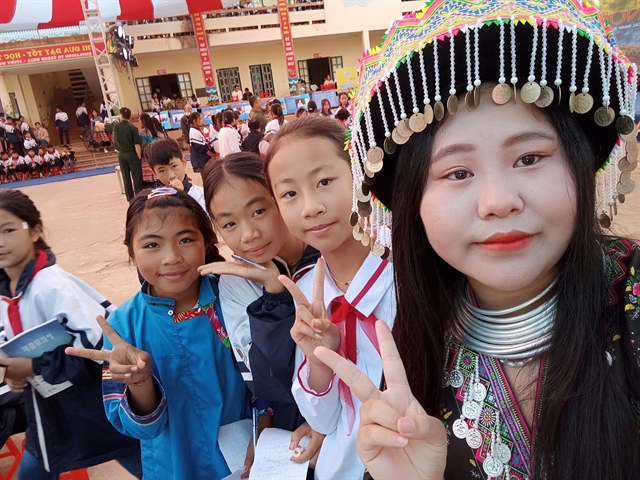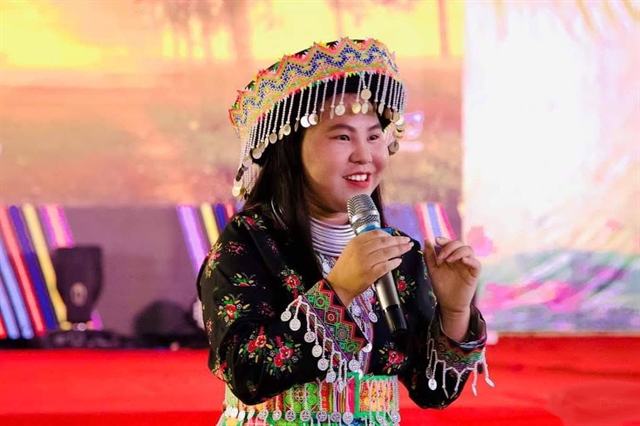 Society
Society

 |
| Sùng Thị Sơ and some student girls at an awareness campaign about child marriage in Lào Cai Province. Photos courtesy of Sơ |
Khánh Dương
At midnight, a message flashed on Sùng Thị Sơ’s computer screen. It was a call for help from a young ethnic minority girl.
“I need your legal consultation for my divorce,” the girl wrote.
She had been married at the age of 15 and, now 20 with two children, she believed the marriage could no longer continue.
Sơ, 23, is the founder of a project that offers free legal consultation to people from ethnic minority communities across Việt Nam.
She has grown familiar with cases like this: Young women trapped in early or forced marriages. Many also suffer from domestic violence or sexual assault.
In just over a year since launching her project, Sơ has received numerous requests for help from women born between the 1980s and 2006, most living in remote mountainous or border areas.
“Most of them are victims of child marriage,” she says.
In many ethnic minority communities in Việt Nam, a deeply rooted stereotype persists that girls should marry at the age of 14 or 15.
This belief deprives them of education and the chance to pursue their dreams.
Sơ, who was born and grew up in an ethnic village in the northern mountainous province of Yên Bái, almost became a victim of this practice.
She was abducted three times when she was 14, 16 and 18 years old and forced into an early marriage with local men.
Unlike many others, she found the courage to speak up and escape.
“My desire to flee poverty drove me to escape from the kidnapping,” Sơ tells Việt Nam News.
“My family is very poor. Despite the fact that my great-grandparents, my grandparents and my parents worked hard in the fields, we never had enough food. I simply wanted a meal to eat, a coat and a pair of shoes to wear throughout the cold.
"I never stopped believing that I could go to college, even when I was being held captive in a forced and early marriage. I don't want to become a victim of domestic abuse which I witnessed in my own family and in my ethnic group since I was a young child.”
The brave young woman finally achieved her dream, becoming the first girl in her village to gain admission to a university in Hà Nội—more than 150km from her hometown.
Having lived through the challenges herself, she understands more than most the lasting harm caused by child and forced marriage.
Now, she is determined to confront the outdated mindsets that still shape the thinking of many young girls and boys in her community.
“Getting married early means if it doesn’t work out, I can still marry someone else before I turn 18,” said a 14-year-old girl who had already gone through two marriages in Sơ’s hometown, when asked about her reason for marrying early.
By founding her legal consultation project, Sơ hopes not only to provide support for victims but also to deliver a powerful message: "Say no to child and forced marriage". Women and girls have the right to go to school and follow their dreams.
Beyond offering legal advice, the activist serves as a passionate speaker in awareness campaigns across various ethnic communities.
Through her inspiring story, Sơ educates other girls to know what child marriage is, its consequences and encourages them to follow their dreams.
 |
| Sùng Thị Sơ brings her inspiring story to raise young people's awareness about child marriage. |
Agent of change
At one event at the Bắc Hà Secondary and High School in the northern mountainous province of Lào Cai, she told students: “There are two things we cannot choose: the parents who gave birth to us, and the circumstances and place we were born into. But everything else — you do have a choice: whether to go to school or not, whether to dare to dream, to take action, to make plans, to set goals. I believe you will succeed.”
Her message resonated deeply with students like Giàng Thị Sinh.
“Through Sơ’s story, I realise that my own situation is similar," Sinh said. "I'm from an ethnic minority group, and my parents are hardworking farmers who manage to send me to school. I truly value that opportunity and will try my best, so I can help them in the future.”
From being a victim of gender-based violence, Sơ has become an agent of change, helping others heal, recover and rise. She inspires girls not only to protect themselves but to become change-makers in their own communities.
“Many girls, after learning about the consequences of child marriage, dared to speak up and report cases happening around them to the local authorities,” she says.
Some former victims, after receiving legal support from Sơ, have even joined her team and committed to helping others walk the same path to freedom and empowerment.
Sơ says child marriage not only affects young girls but also young boys.
In many of the cases she has handled, couples married at a young age later sought divorce.
Most of these couples only registered their marriage officially when the man turned 20 and the woman 18, in accordance with Vietnamese law.
But long before that age, they already had children. The husbands could face criminal charges due to child marriage.
“When these cases go to court, the husbands may face criminal charges for having had sexual relations with girls under the age of 16. This makes early marriage and subsequent divorce legally complex not only for women but also men,” Sơ says.
In line with national action plan
.JPG) |
| Sơ brought her own story to the world by attending a youth exchange programme in Nepal in 2024. |
In Việt Nam, the goal of eliminating child marriage in ethnic minority communities has been integrated into both provincial and national development programmes.
Sơ’s impactful work in supporting survivors of gender-based violence aligns with the objectives of Việt Nam’s National Action Plan on Women, Peace and Security, which was launched in 2024, particularly the commitment to protect women from gender-based violence.
Her free legal consultation services also contribute to the action plan’s goal which is to ensure that 90 per cent of women and girls subjected to violence in Việt Nam are identified and have access to at least one essential support service by 2030.
Sơ hopes that her story will reach more young girls and inspire them to make informed choices.
“I hope young people will be truly wise in every decision they make. At this age, it’s important to focus on your rights and responsibilities — and one of those is to study hard. For those who may not have the opportunity to continue their education, it’s still possible to find jobs that match their abilities, allowing them to learn, gain experience and grow.
“Yesterday, I received an email from a girl living next door, about the same age as me. She told me she had just refused an arranged marriage and decided to take a job in the city.”
While Sơ’s legal service remains available for those in need, she hopes that more messages like this, with courage and self-determination, will arrive, instead of desperate calls for help. VNS